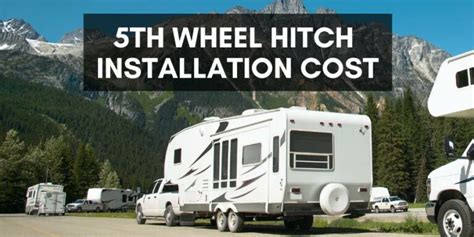Save Money: Hitch Installation Cost-Saving Tips
Installing a hitch on your vehicle can significantly enhance its functionality, allowing you to tow trailers, carry bikes, or haul cargo. However, the installation costs can sometimes be surprising. This comprehensive guide explores effective strategies to minimize hitch installation expenses without compromising quality or safety. We'll delve into various aspects, from choosing the right hitch to finding the most cost-effective installation options.
How Much Does Hitch Installation Typically Cost?
The cost of hitch installation varies considerably depending on several factors:
- Type of Hitch: Class I hitches are generally the cheapest, while Class III and IV hitches, designed for heavier towing capacities, tend to be more expensive. The complexity of the installation process also increases with higher classes.
- Vehicle Make and Model: Some vehicles have easier-to-access hitch installation points than others. Access to these points can influence labor costs.
- Installer's Labor Rates: Labor rates fluctuate regionally and based on the installer's experience and reputation. Independent mechanics often offer lower rates than dealerships.
- Additional Services: If you require additional services like wiring for trailer lights, the overall cost will increase.
While a simple Class I hitch installation might cost between $100 and $200, more complex installations can reach $300 or more. Understanding these variables allows you to better anticipate costs and plan accordingly.
Choosing the Right Hitch: A Cost-Effective Approach
Selecting the appropriate hitch is the first step toward saving money. Overspending on a hitch with a higher towing capacity than you need is wasteful. Carefully assess your towing needs:
- What will you be towing? The weight and size of your trailer dictate the class of hitch required.
- Check your vehicle's owner's manual: It provides vital information about your vehicle's towing capacity. Exceeding this capacity is dangerous and illegal.
- Research compatible hitches: Websites and retailers often offer detailed compatibility charts to help you choose the right hitch for your vehicle.
Choosing the correct hitch from the outset prevents the need for costly replacements or upgrades later.
DIY Hitch Installation: A Potential Cost Saver (Proceed with Caution!)
Many individuals attempt DIY hitch installation to save money. However, this approach requires mechanical aptitude and the right tools. Improper installation can lead to safety hazards and void warranties.
Before considering DIY installation:
- Assess your mechanical skills: Are you comfortable working with vehicle mechanics? Do you possess the necessary tools?
- Consult detailed instructions: Follow the hitch manufacturer's instructions precisely.
- Consider the risks: Improper installation can lead to serious consequences.
Finding Affordable Installation Options
Several strategies can help you find affordable hitch installation:
- Compare quotes from multiple installers: Obtain quotes from various sources, including local mechanics, auto parts stores, and specialized hitch installers.
- Check for discounts and coupons: Many installers offer discounts or coupons, especially during off-peak seasons.
- Consider independent mechanics: Independent mechanics often charge lower labor rates than dealerships.
- Shop around for hitch purchases: Don't just buy the hitch from the installer; compare prices at different retailers to find the best deal.
Bundling Services: Can it Save You Money?
Some installers offer bundled services, combining hitch installation with additional work like wiring for trailer lights. While this might seem convenient, carefully compare the cost of bundled services with getting each service done separately. You might save money by opting for individual services if you can source the parts yourself at a lower cost.
Planning Ahead: Avoiding Unexpected Costs
Unexpected costs can arise during installation. Preparing in advance mitigates these risks:
- Check for potential obstacles: Inspect your vehicle for any potential obstacles that might complicate the installation process, such as rust or difficult-to-access areas.
- Gather necessary tools: If you're doing a DIY install, ensure you have all the required tools. Renting tools can be a cost-effective alternative to buying them.
- Factor in unexpected delays: Unexpected delays can occur; build extra time into your schedule.
Maintaining Your Hitch: Long-Term Savings
Proper maintenance prolongs your hitch's lifespan, preventing premature failure and avoiding costly replacements. Regularly inspect your hitch for signs of wear and tear. Tighten bolts as needed and address any issues promptly.
By employing these cost-saving tips, you can enjoy the benefits of a vehicle hitch without breaking the bank. Remember, safety should always be the top priority. If you're unsure about any aspect of the installation process, it's best to seek professional help.

